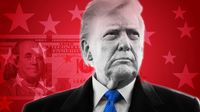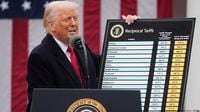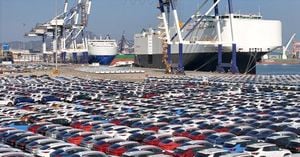In a dramatic escalation of trade tensions, US President Donald Trump announced sweeping new tariffs on imports from the European Union and other countries on April 2, 2025. The tariffs, which include a 20% levy on EU imports and a staggering 25% on foreign-made automobiles, have sent shockwaves through global markets and raised fears of a potential trade war.
During a speech in the White House Rose Garden, Trump declared the day as "liberation day," asserting that the tariffs are necessary to protect American industries and to correct what he described as unfair trade practices. "They're ripping us off. It's so sad to see," Trump remarked, referring to the EU's trade practices. He emphasized that the tariffs are a form of economic self-defense against countries that have historically imposed higher tariffs on US goods.
As part of his broader strategy, Trump stated, "They do it to us, we do it to them," reiterating his position that the US has been treated unfairly in trade agreements. He described the tariffs as a "declaration of economic independence" and claimed they would lead to a rebirth of American manufacturing, aiming to make the nation wealthier.
The announcement has prompted immediate reactions from European leaders and investors. European stocks fell sharply in anticipation of the tariffs, with the benchmark STOXX Europe 600 index closing 0.5% lower. Germany's DAX index also dropped by 0.7%, reflecting investor anxiety over the economic implications of the tariffs. Goldman Sachs has already revised its forecasts for European markets, citing the expected impact of Trump's trade policies.
In response to the tariffs, the European Union is preparing retaliatory measures, which could include tariffs on American products like Harley Davidson motorcycles and Levi's jeans. EU Commission officials have indicated that they may restrict intellectual property rights for US companies and enforce penalties on major tech firms like Apple and Google. The EU's Anti-Coercion Instrument could also be employed to counteract US trade policies, potentially impacting US banks and patents.
Meanwhile, Mexico's President Claudia Sheinbaum stated that her country is not looking to engage in a tit-for-tat tariff battle with the US. She emphasized that Mexico would announce a comprehensive economic program rather than retaliate directly against US tariffs. "Let's see what announcement they make, but we have a plan to strengthen the economy under any circumstance," Sheinbaum said.
German Finance Minister Jörg Kukies expressed concern over the potential consequences of the tariffs, stating that they could adversely affect consumers in the US by raising car prices. He noted that many German automakers produce vehicles in the United States, and the tariffs could lead to higher costs for American consumers. Kukies advocated for negotiations with the Trump administration to avoid escalating tensions.
Italy's Prime Minister Giorgia Meloni also weighed in, warning that the new tariffs would significantly impact Italian producers. She called for a united European response to the tariffs but emphasized the need for dialogue rather than immediate retaliation. Italian EU Affairs Minister Tommaso Foti echoed this sentiment, advocating for a reasoned approach rather than a gut reaction.
As the situation unfolds, economists are predicting that the tariffs could have a profound impact on the global economy. A report from the Organisation for Economic Co-operation and Development (OECD) warned that if tariff rates are permanently raised by the US and its trading partners, global output could decline by approximately 0.3% within three years. Furthermore, global inflation could increase by an average of 0.4 percentage points annually during the same period.
In the automotive sector, the new tariffs are expected to hit Germany's car industry the hardest, as it is the most exposed to the 25% auto tariffs. Economists at Dutch bank ING highlighted that while Germany's automotive sector faces significant challenges, Slovakia, which exports a large volume of cars and car parts to the US, could feel the most substantial impact overall.
As the tariffs take effect, US consumers are likely to face increased prices for imported goods. For instance, JP Morgan has estimated that a 25% tariff could raise the price of new cars by about $4,000, further straining household budgets. The potential for rising living costs and decreased consumer confidence could dampen economic growth in the US, with Goldman Sachs projecting that foreign boycotts could lower GDP by 0.1% to 0.3% in 2025.
In the lead-up to the announcement, US car manufacturers such as Volkswagen and BMW reported strong sales in the first quarter, suggesting that consumers may be making preemptive purchases ahead of the tariffs. Volkswagen's sales rose by 7.1%, while BMW saw a 3.7% increase in sales, indicating that the looming tariffs have already influenced consumer behavior.
Overall, the imposition of these new tariffs marks a significant shift in US trade policy and raises questions about the future of international trade relations. As countries around the world prepare to respond, the potential for a trade war looms large, with implications that could affect economies globally.






